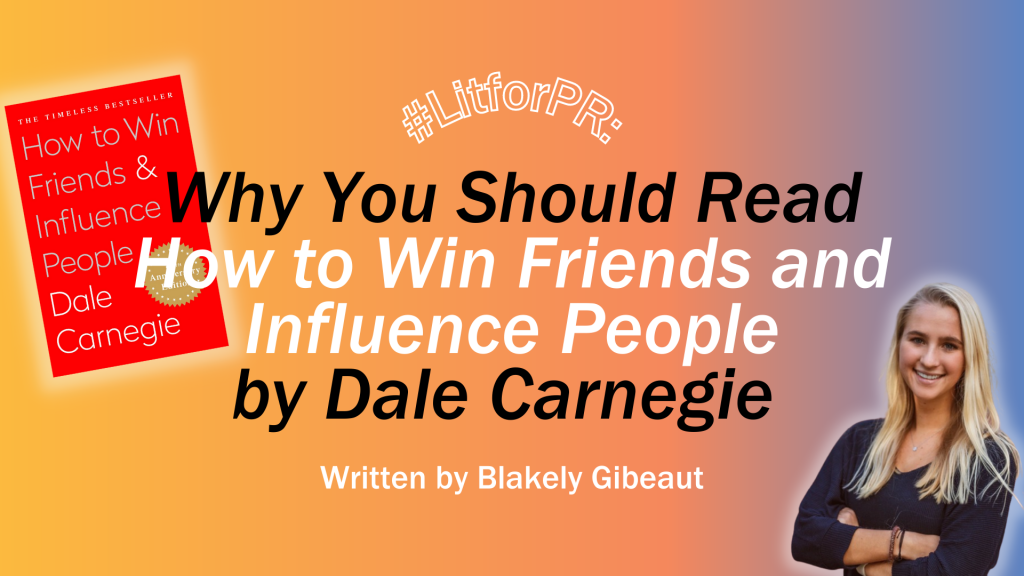#LitforPR: Why You Should Read How to Win Friends and Influence People by Dale Carnegie

As a rising senior, I’ve grown to enjoy books that make me feel more prepared for life after college. ‘The real world’, as we like to call it. One day this summer, I found myself roaming through the local Barnes and Nobles in search of an enlightening tale on how to be successful. When I saw ‘The Only Book You Need to Lead You to Success’ written on the cover of How to Win Friends and Influence People by Dale Carnegie, I thought to myself, “That looks like it will do!” Little did I know that the book I had just picked up would transform the way I went about my everyday interactions. Originally written in 1936, How to Win Friends and Influence People is a book that has been helping people for over 80 years. The lessons in it will help you grow your network, create more allies, become a better leader and more. If you, too, are looking for a good read to help you excel in ‘the real world’, I can’t recommend this book enough. To help you better understand, here are some of my key takeaways from How to Win Friends and Influence People:
- Ask more questions.
Before reading this book, I thought I was a great conversationalist. After reading this book, I have realized that I am terrible at it! One of the biggest things I learned was that most people are interested in the things that they are interested in, not the things that you are interested in. It seems like common sense, right? But for so long I talked about my own interest in conversations. If you are trying to make a connection, grow your network or influence someone, it is important to become genuinely interested in what the other person has to say. Ask them more questions and make it about them. This principle is number five in the section, ‘Six Ways to Make People Like You.’
- Remember people’s names.
If you forget someone’s name, you’re screwed. Okay, maybe not entirely screwed, but the title of this section is, “If You Don’t Do This, You Are Headed for Trouble.” Carnegie talks about the importance of remembering people’s names, and the disadvantage if you forget them. He uses the example of Jim Farley, who grew up as a poor boy and worked his way to work with Franklin D. Roosevelt in the White House. Carnegie says, “Jim Farley discovered early in life that the average person is more interested in his or her own name than in all the other names on earth put together.” By remembering people’s names, you have shown that you care. And if you are trying to get a job or grow your network, you want to show you care!
- The only way people will do something, is if they want to do it.
One of the main themes in this book is persuasion, something that is key in the world of public relations. If there is anything I learned from this book that has helped me grow my public relations skills, perhaps it is this: The only way people will do something is if they want to do it. That is literally the only way to convince people to adopting your way of thinking. So, the question then becomes, how do you get people to want to do something? Dale Carnegie answers that in many ways and provides helpful tips to win people over throughout the book.
If this book is of interest to you, you can learn more about it on goodreads. If you are interested in talking to Blakely more about her takeaways, email bgibeaut@iu.edu

Blakely Gibeaut is a senior at Indiana University Bloomington and president of her Chapter this year. She is studying public relations with a double minor in marketing and Spanish. Outside of school, you can find her indulging in the latest self-help book, watching anything by Anthony Bourdain, or training for an upcoming half marathon.
